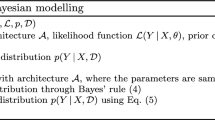Abstract
The standard approach to solve prediction tasks is to apply inductive methods such as, e.g., the straight rule. Such methods are proven to be access-optimal in specific prediction settings, but not in all. Within the optimality-approach of meta-induction, success-based weighted prediction methods are proven to be access-optimal in all possible continuous prediction settings. However, meta-induction fails to be access-optimal in so-called demonic discrete prediction environments where the predicted value is inversely correlated with the true outcome. In this paper the problem of discrete prediction environments is addressed by embedding them into a synchronised prediction setting. In such a setting the task consists in providing a discrete and a continuous prediction. It is shown that synchronisation constraints exclude the possibility of demonic environments.
Similar content being viewed by others
References
Arnold, E. (2010). Can the best-alternative justification solve Hume’s problem? On the limits of a promising approach. Philosophy of Science, 77(4), 584–593. http://www.jstor.org/stable/10.1086/656010.
Bell, J. L. (2013). Continuity and infinitesimals. In E. N. Zalta (Ed.), The Stanford Encyclopedia of Philosophy (Winter 2015 Edition). http://plato.stanford.edu/archives/win2015/entries/continuity/.
Cesa-Bianchi, N., & Lugosi, G. (2006). Prediction, learning, and games. Cambridge: Cambridge University Press.
Descartes, R. (1998). Discourse on method. In D. A. Cress (Ed.), Indianapolis: Hackett Publishing Company.
Howson, Colin. (2000). Hume’s problem. Oxford: Clarendon Press.
Leibniz, G. W. (1896). New essays concerning human understanding. New York: The Macmillan Company. Translated from the Original Latin, French and German with Notes by Alfred Gideo Langley.
Leitgeb, Hannes. (2017). The stability of belief: How rational belief coheres with probability. Oxford: Oxford University Press.
Longino, H. E. (2008). Values, heuristics, and the politics of knowledge. In M. Carrier, D. Howard, & J. A. Kourany (Eds.), The challenge of the social and the pressure of practice: Science and values revisited (pp. 68–87). Pittsburgh: University of Pittsburgh Press.
Reichenbach, H. (1938). Experience and prediction: An analysis of the foundations and the structure of knowledge. Chicago: University of Chicago Press.
Schurz, G. (2008). The meta-inductivist’s winning strategy in the prediction game: A new approach to Hume’s problem. Philosophy of Science, 75(3), 278–305.
Schurz, G. (manuscript). The optimality of meta-induction. A New Approach to Hume’s Problem.
Schurz, G., & Thorn, P. D. (2016). The revenge of ecological rationality: Strategy-selection by meta-induction within changing environments. Minds and Machines, 26(1), 31–59. doi:10.1007/s11023-015-9369-7.
Thorn, P. D., & Schurz, G. (2012). Meta-induction and the wisdom of crowds. Analyse and Kritik, 34(2), 339–366.
Acknowledgements
This research was funded by the Austrian Academy of Sciences (OeAW, DOC grant) and the Deutsche Forschungsgemeinschaft (DFG priority program SPP 1516 “New Frameworks of Rationality”). I would like to thank two anonymous referees for very helpful comments. For valuable discussions on this topic I would like to thank Alexander Christian, Alexander Gebharter, and Gerhard Schurz.
Author information
Authors and Affiliations
Corresponding author
Rights and permissions
About this article
Cite this article
Feldbacher-Escamilla, C.J. Optimisation in a Synchronised Prediction Setting. J Gen Philos Sci 48, 419–437 (2017). https://doi.org/10.1007/s10838-017-9379-7
Published:
Issue Date:
DOI: https://doi.org/10.1007/s10838-017-9379-7




